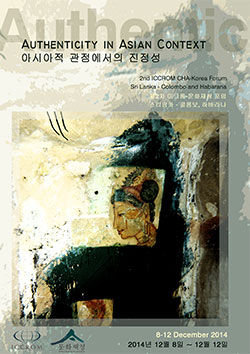The authenticity in the asian context
The objective of the 2014 Forum was to examine the ways ‘authenticity’ is applied to the Asian context in relation to the international context, and suggest alternative approaches to authenticity. The participants discussed the question: What is the relevance of the concept of authenticity for more effective conservation and management of heritage in Asia?
This Forum took place during the 20th anniversary of the Nara Document and provided an opportunity to revisit the concept of authenticity. The Forum’s theme emerged from the concern that, in some circumstances in Asia, the concept of authenticity from the conservation discourse poses challenges to conservation practice. This is evident in some international approaches and obligations that may make it difficult to address specific local cultural circumstances with a bearing on heritage conservation. As a counterpoint to this, some local cultural and/or religious practices may hinder the work of conservationists aiming to meet international requirements.
The Forum participants highlighted the validity of different approaches to conservation in Asia and questioned the western concept of authenticity. They identified and discussed a range of issues associated with the use of the term ‘authenticity’ in the assessment of World Heritage, but which are also echoed in other heritage evaluation processes.
As a result of the discussions, the participants of this meeting questioned the continued validity of the prevailing concept of ‘authenticity’ within World Heritage discourse and beyond.
Member States represented: Australia, Bangladesh, Cambodia, China, India, Japan, Malaysia, Nepal, Philippines, Republic of Korea, Sri Lanka, Thailand, Zimbabwe
Institutions:
- Cultural Heritage Administration (CHA) of Korea
- Department of Archaeology (Sri Lanka),
- Ministry of National Heritage (Sri Lanka),
- Postgraduate Institute of Archaeology (Sri Lanka), University of Kelaniya

